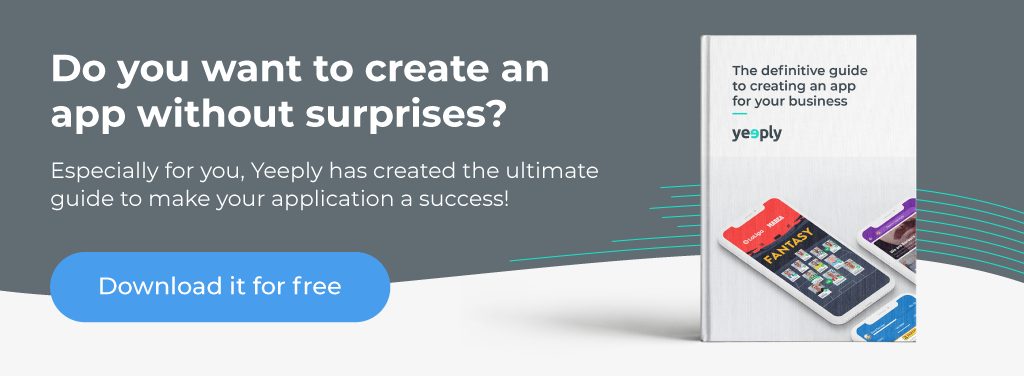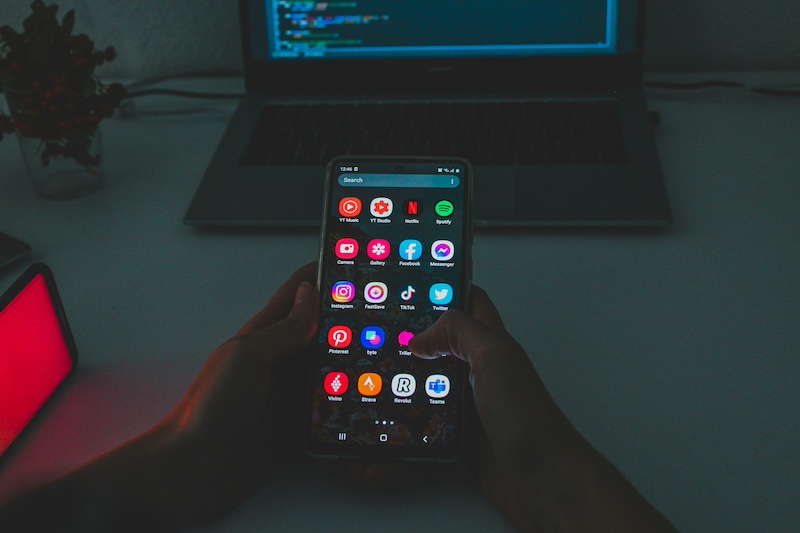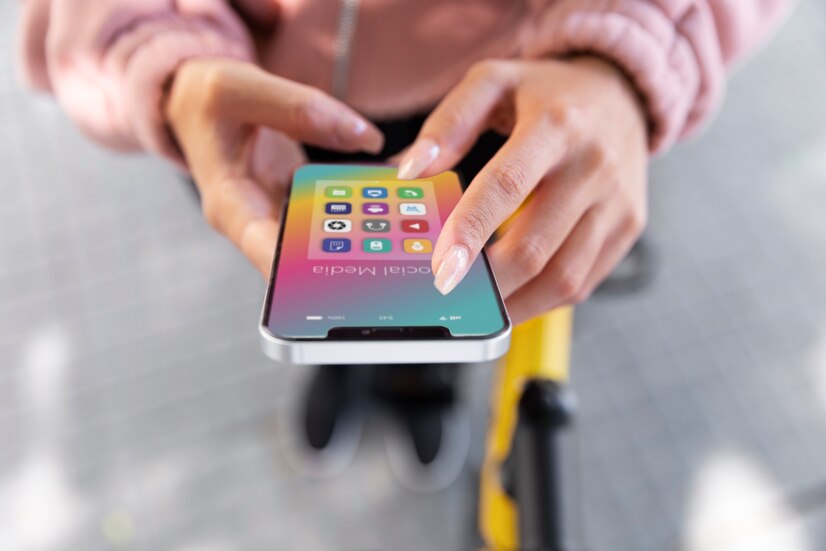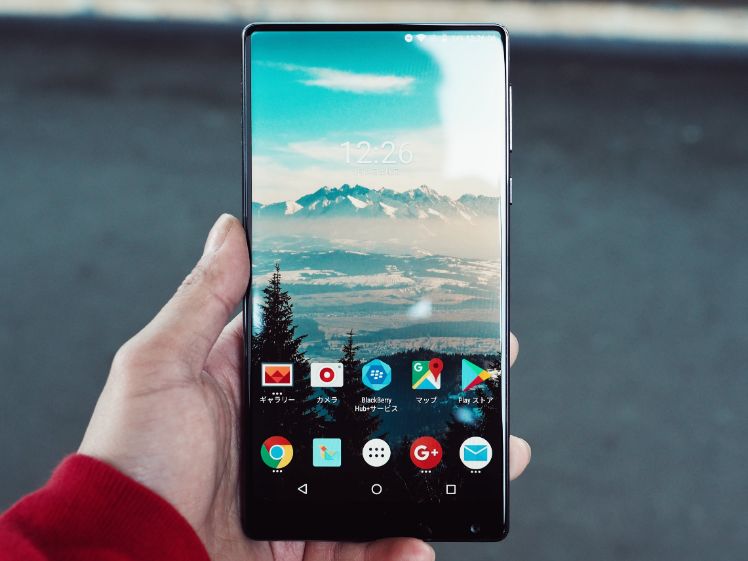You might have an idea for an application and are thinking about hiring a developer to carry it out. But you still do not know what steps you must take to define a mobile app project properly.
At Yeeply we are not only experts in outsourcing the development of apps but we will help your mobile app project be as complete and correct as possible. With these essential steps, you’ll be able to define the key aspects of your app, receive tailored budgets and it’ll be easier to find a suitable developer to create your app.
Define the essentials
First of all, you must ensure that the mobile app project you want to be developed, has the potential to succeed in the market. Therefore, you must analyse and define the target audience for your application. You must determine what type of device it will be available for Android, iOS, tablet or smartphone. This might be useful to find out how your target audience will eventually use your app and at what times. For example, there are major differences if it’s being used on the go or from the couch at home, this may help decide if your app should work horizontally or vertically.

Location of use
The location of use is also important, for example, whether the app needs WiFi to work properly. It’s not the same to develop a mobile app for home use, somewhere where WiFi is already available, compared to an app that is designed to be used in the mountains, where it will probably need to work offline.
Budget
Above all, the budget is crucial. Ask yourself how much time you are willing to spend on the development process of the application. In the majority of cases, this usually depends on the type of user or the needs that need to be satisfied.
Ask for opinions
To determine whether your mobile app project can become a successful application, you should ask people if you really need to create it. Be truly critical of the product or service of the mobile application you want to launch. The best way to find this out is by asking people in your target audience if there is any application that currently meets this need and if they would be willing to pay for a mobile application to fulfill that need. In case you want to develop an app as a complement to your business, you should ask your clients what they think about the idea.
Ensure that you have thoroughly investigated whether there are any mobile applications that already do what you wish to provide. Maybe there is competition, but this doesn’t have to discourage you, there are plenty of things you can do to develop your own version and move forward. You can improve it, offer it cheaper to the public or make it faster.
Monetization strategies
Are you planning on making money with the app? If the answer is yes, with exception to social media apps, you have to be clear about how you want to achieve this. You can’t simply state that you want to earn money with the app through advertising. Without a clear strategy, it’s simply not going to work. Here are some examples of monetization strategies:
- Charging a download fee: the user pays a small fee to download the app. Investigate the competition if you use this technique and investigate what price strategy they’re using.
- In-app advertising: like banners, interstitial, recommendations of other apps, push videos and many more.
- Freemium model: giving a user a free version and allowing them to pay a monthly subscription for extra features.
- In-app purchases: changing the model to mobile-based selling where products are available through the e-commerce app itself.
- In-app micro-payments: this means you can pay in a timely manner for certain products or services. This is the classic model of monetizing games where you pay small amounts of money for specific activities or certain features.
Do not forget to define what devices your mobile app is going to be available for, exploit it to the max! Take into account that you should be taking advantage of all the functionalities that can be drawn from the devices and make them count, regardless of the operating system.
You might be interested | Mobile App Trends to Watch in 2020
Specify
Remember that freelance developers or app development companies can’t see what is going on inside your head, so try to convey the most information, as clear as possible. You might be a bit sceptical about this in the first place because you don’t want to share the detailed information about your project with others. However, industry experts support the theory that the idea itself is not worth much, it’s the team of developers and people who carry it out who make it successful.
However, there are still other ways to protect your intellectual property, with for example a confidentiality agreement. This document can be signed before contracting a developer or development company to protect your idea.

Answering the following questions will help you to specify your mobile app project for developers:
1) What is the functionality of the app?
How many different screens will be required in the mobile app, what are their functionalities, what is the use of the app itself and how will the user use it. Ideally, the prototype is visualised with use cases, as a tool to establish the flow between screens. Explaining the functionalities by visualising and defining it specifically, the developer will be able to understand exactly what he has to do.
2) Is there an existing app that can serve as an example?
A referral application can contribute to the development of your mobile app project. It might be possible that there are already similar mobile app projects existing, but with a different functionality, price or focused on a different market. However, you could use these apps to get some inspiration.
3) Will the users need to register within the application?
It is possible to link this feature to Facebook, Twitter, Google+ or LinkedIn. If you wish to capture a user to store their data you will need to include registration. It is common to use social networks to register, this is due to the fact that you can also get additional information from these networks, useful to hang on to. If you’re going to need the user to have his own profile within the app, this functionality can be very useful.
4) Do you want to share content on social networks?
If your app has social potential, your users can be your best commercial asset if you give them the right opportunity to share. When enhancing an option to share things, think about including ways to compensate for gamification in mobile applications as they have very good results.
5) Does the app use features of the phone itself?
This could be the camera, geolocation, multimedia, push notifications, calendar etc. Try to get the most out of the device and keep in mind that a lot of apps need a data connection or drain battery power from the device quickly. Define what you need extensively, as certain programming tools do not allow the use of some features.
6) Do you need a method of payment?
If you’ve decided how to monetize your app and let the user make in-app purchases, make sure you give them the opportunity to do this with the maximum facilities. Use known payment systems and apply them in the most common way to ensure the customer feels confident when spending their money on your mobile app.
7) Which platforms do you wish your app to be available for?
The app could be native (for one operating system) or for several. The most common operating systems are Android and iOS. A good mobile web ensures it is suitable for all kinds of devices (responsive or adaptive web). Or if you need you can opt for native, i.e. the app is developed in the language of each operating system. There are tools (called frameworks) that develop simultaneously on multiple operating systems. In some cases, they have limited functionality, design or operating speed. But they serve very well for prototypes as they are much cheaper and allow testing within the market.
8) Do you need help with the design or do you need an important layout?
Depending on the level of quality required for the design, you must have at least one design expert in your development team. You have to take into account the importance of usability and user experience since in many cases a poorly designed app leads to failure. The user may assume it’s from low quality, not attracting enough to start using it, or even never downloaded in the worst case.
9) Will you need a web service to store data?
If your app needs to store data in the cloud or on the same mobile device, it must be taken into account to define the size of the server that it is stored in. You will also have to take into account the monthly cost and ask for a monthly maintenance service on that server.
10) Do you want an admin panel to manage the data and communication with the user?
Most apps usually require to include an information management panel. You need to have usage statistics to communicate with users (via notifications, SMS or by mail). Through this feature, you can manage user fees.

Once you have defined the mobile app project…
Have you thought about how you want to promote your mobile app project? And how you will achieve downloads and a respectable position in the markets? Keep in mind that you can make major investments to create a mobile application and bring it to the market but if you don’t reach your target audience, you will only waste your time and money. So do not spend your whole budget on the development of your app but save a part for the marketing campaigns.
Before launching the application you must have a well-defined mobile app marketing strategy. Here is a brief list to define the essentials:
- Natural search engine ranking within app Markets (ASO): There are a number of parameters to be followed when optimizing search in the search engines. Title, keywords, description, ratings, comments of users and the number of downloads is the most important aspect in ASO. These elements will help users to work out what the app offers at a glance: the logo, application screenshots, and a video presentation.
- You can also opt to directly purchase downloads. There are many recommended apps and tools that allow payment in exchange for downloading apps from highly segmented audiences and thus increases downloads of application.
- The landing page or website presentation is also essential. If your project only contains a mobile application, it is significant that you have in mind a custom web design or even a static page with the download links. This allows you to have a page in which to present the product and improve your positioning on the web.
- Generate and send press releases to specialised media outlets. Find specialised media that reaches your audience and try to publish an article presenting your mobile app project, with indications to download the app. This allows you to further improve the positioning of your mobile app downloads and reach your target audience. If bloggers write about your app or reviews are written at the downloading page, positive opinions could help to move your marketing campaign forward. This type of articles are shared on social networks and are likely to be read by your target audience.
Once you have followed all these steps we suggest you reach out to Yeeply, a specialised platform where you can find the best mobile app developers and mobile marketing experts to make your project successful.








